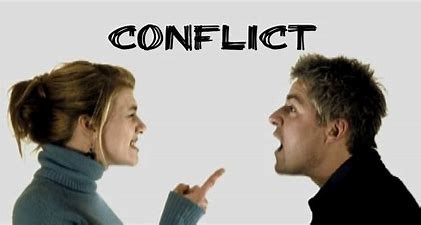
Earlier in the week, a group I belong to held a webinar on workplace conflict. One definition from wikipedia is as follows:
Organizational conflict, or workplace conflict, is a state of discord caused by the actual or perceived opposition of needs, values and interests between people working together. Conflict takes many forms in organizations. There is the inevitable clash between formal authority and power and those individuals and groups affected. There are disputes over how revenues should be divided, how the work should be done, and how long and hard people should work. There are jurisdictional disagreements among individuals, departments, and between unions and management. There are subtler forms of conflict involving rivalries, jealousies, personality clashes, role definitions, and struggles for power and favor. There is also conflict within individuals – between competing needs and demands – to which individuals respond in different ways.
That all sounds quite negative.
Part of the discussion was an informal survey about the amount of time spent involved in conflict during any day. Now keep in mind this was a group of M&A brokers who deal regularly with conflict. Some respondents said that 50% of their time on any given day was spent dealing with conflict. The conflict could be with the business owner over the price and terms of the sale of the business, or the buyer over the price and terms of the sale of the business. Funny, it seems to come down to the same topic most of the time!!
Stepping back from that, I thought about the importance of organizational conflict. As we saw by the definition it typically has a negative connotation. On the other hand, conflict is necessary, war is not. One person added that if they have two employees who think the same way all the time, the employer does not need one of them.
There is plenty of information available on conflict resolution that you can discover on your own, but during the conversation I realized that I have experienced extreme degrees of conflict. In one instance there was too much conflict, resulting in people “shutting down” and not offering alternative views. Alternatively, in another situation, there was too much trust resulting in a lack of questioning of ideas. The absence of conflict in either case was not good.
How can there be too much conflict? It is an environment where alternative views are not tolerated and the person with authority makes a decision. That tends to evolve into an environment where people stop offering their point of view and just wait for direction from the person in authority. That is fine if the person in authority is omnipotent and all knowing, but what the person in authority has done is deprive themselves from the benefit of an alternative viewpoint. That is not beneficial for the organization’s health and periodically you might hear the person in charge complain “why am I the only person making a decision?” The person in charge has created a lonely space in which to operate and hopefully has not imperiled the organization by considering one viewpoint only.
A complete lack of conflict is also not healthy. Some time ago, I was a CFO for a large US subsidiary of a foreign parent. Some things occurred within the company where trust became an issue, but for some reason people developed a high level of trust in me. That was fine but having a lot of trust in a person’s integrity does not make them smarter. I remember meeting with the president and when I started to discuss something I thought we needed to do, he stopped me before I could finish the explanation and said, “go ahead if that is what you want to do”. I surprised myself when I explained that he needed to push back a bit because although this is something I want to do, I am not sure it is the right thing to do. That followed with a healthy conversation on the pros and cons of the matter. It was some time ago, and I do not recall whether the idea was accepted, but I do know we made a more thoughtful decision.
I remember growing up and my parents would have to make various decisions. They never had conflict in front of their children, but they did have discussions alone on the pros and cons of various things involving the family. Somehow I think my mother’s point of view prevailed more frequently, but they always had a thoughtful and respectful discussion.
The result from yesterday’s discussion was a revived appreciation of what it means to have “conflict”. It should not only be inevitable, but also important for the life of any organization.


